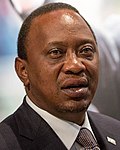A coalition government is a cabinet of a parliamentary government in which multiple political parties cooperate, reducing the dominance of any one party within that "coalition". The usual reason for this arrangement is that no party on its own can achieve a majority in the parliament. A coalition government might also be created in a time of national difficulty or crisis to give a government the high degree of perceived political legitimacy or collective identity it desires while also playing a role in diminishing internal political strife. In such times, parties have formed all-party coalitions. If a coalition collapses, a confidence vote is held or a motion of no confidence is taken.

The politics of Kenya take place in a framework of a presidential representative democratic republic, whereby the President of Kenya is both head of state and head of government, and of a multi-party system in accordance with a new constitution passed in 2010.

The National Rainbow Coalition (NARC) is a political party in Kenya. As an alliance, it was in power from 2002 and 2005 when it collapsed due to disagreements between members over a constitutional referendum.

The Scottish Parliament election, 2003, was the second election of members to the Scottish Parliament. It was held on 1 May 2003 and it brought no change in terms of control of the Scottish Executive. Jack McConnell, the Labour Party Member of the Scottish Parliament (MSP), remained in office as First Minister and the Executive continued as a Labour and Liberal Democrat coalition. As of 2019, it remains the last general election victory for the Scottish Labour Party.
The Liberal Democratic Party was a political party in Kenya.

Elections in Kenya take place within the framework of a multi-party democracy and a presidential system. The President, Senate and National Assembly are directly elected by voters, with elections organised by the Independent Electoral and Boundaries Commission (IEBC).
The Democratic Party (DP) is a conservative political party in Kenya. The party was founded in 1991 by John Keen and Mwai Kibaki after section 2A of the constitution was repealed. At the legislative elections, 27 December 2002, the party was a partner in the National Rainbow Coalition, which won 56.1% of the popular vote and 125 out of 210 elected seats. The party itself took 36 of these seats. At the presidential elections of the same day, the party supported Mwai Kibaki, who won 62.2% and was elected. Kibaki is the leader of the DP. At the Kenyan general election, 2007, Democratic Party is part of the Party of National Unity led by President Mwai Kibaki in the chaotic 2007 general election and one of its members, Wilfred Machage, was named a cabinet minister in the half cabinet which Kibaki named prior to the formation of the Grand Coalition government.
The National Party of Kenya (NPK) is a political party in Kenya. At legislative elections, 27 December 2002, the party was a partner in the National Rainbow Coalition, that won 56.1% of the popular vote and 125 out of 212 elected seats. The party itself took 6 of these seats. At the presidential elections of the same day, the party supported Mwai Kibaki, who won 62.2% and was elected. The party was founded in 1992. Its chaiperson was Charity Ngilu.

The National Rainbow Coalition–Kenya (NARC–Kenya) is a political party in Kenya. The party was formed after the defeat of the Government sponsored Draft constitution. It was formed by National Rainbow Coalition members loyal to the government. The party, though months old, captured 3 parliamentary seats and 2 Civic seats in the by-elections of 24 July 2006 that are seen as a litmus test for the upcoming general elections for which the new party was planned to play a major role in securing reelection for president Kibaki.

Party of National Unity (PNU) was founded as a political coalition of parties in Kenya. On 16 September 2007, Kenyan President Mwai Kibaki announced the party formation and said that he would run as its presidential candidate in the December 2007 Kenyan elections. It has since become a political party in its own right following conditions set by the Political Parties Act, passed in Kenya in 2008.

General elections were held in Kenya on 27 December 2007, electing the President, National Assembly and local councils.

General elections were held in Kenya on 29 December 1992, the first multi-party elections since independence. The results were marred by allegations of ballot-box stuffing, and targeted ethnic violence in the Rift Valley Province. Human Rights Watch accused several prominent Kenyan politicians, including President Daniel arap Moi and then-VP George Saitoti of inciting and co-ordinating the violence. They were also the first elections to feature a ballot for the post of President, who had, in 1964, been elected by the National Assembly, and, following a 1969 constitutional amendment, been automatically declared winner of non-held popular elections, held alongside parliamentary elections, in 1969, 1974, 1979, 1983, and 1988. Voter turnout was 69.4%.

The Government of the Republic of Kenya (GoK) is the national government of the republic of Kenya which is composed of 47 Counties, each county with its own semi-autonomous governments. The national government is composed of three arms: the legislature, the executive and the judiciary. Each arm is independent of the other and their individual roles are set by the Constitution of Kenya. The full name of the country is the "Republic of Kenya". Its official Swahili name is 'Jamhuri ya Kenya'. Other terms such as GoK, GK and Serikali are popularly used to refer to the Kenyan government.

General elections were held in Kenya on 6 December 1969, the first since independence in 1963. The country had become a de facto one-party state after President Jomo Kenyatta had banned the Kenya People's Union on 30 October, with Kenyatta's Kenya African National Union being the sole party to participate in the election. Although the post of President of Kenya was due to be elected at the same time as the National Assembly, Kenyatta was the sole candidate and was automatically elected without a vote being held.
The New Forum for the Restoration of Democracy–Kenya, commonly known as New Ford Kenya was a political party in Kenya.

The National Alliance (TNA) was a political party in Kenya. It attained its current identity when it was taken over by Uhuru Kenyatta and rebranded as the vehicle for his 2012 presidential campaign.
Peter Adhu Awiti was a Kenyan politician who served as a member of the National Assembly for Karachuonyo Constituency from 1997 until 2007. He also served in former President Daniel arap Moi's final government cabinet as Minister for Planning from 2001 until 2002.

The National Labour Party (NLP) is a political party in Kenya.












